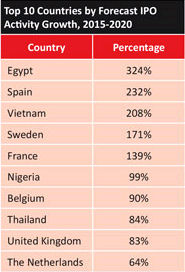IPO activity will triple in Spain by 2020, but with law firms undercutting rivals on price and handling work inefficiently, whether they can profit from such opportunities is in doubt
It is anticipated that Spain will be the country that
experiences the second largest increase in IPO activity by the end
of the decade, according to research conducted by Baker &
McKenzie in association with Oxford Economics. However, despite
predictions that IPO activity in Spain will grow by 232 per cent by
2020, opinions on how profitable such work is for law firms
differ.
Spanish capital markets lawyers are indeed predicting a flurry of
IPO-related instructions. Iñigo Berrícano, managing
partner of Linklaters' Madrid office, believes that the
increase will be a result of disinvestments made by private equity
funds, as well as the potential flotation of companies that were
acquired by opportunistic funds and newcomers to the Spanish
financial sector. In addition, Berricano says IPOs will also
increase due to the listings of former savings banks, and offerings
involving the subsidiaries and businesses of already listed
companies.
Fierce competition
As such, competition for the lead roles on IPOs is fierce,
although a headline instruction is not always particularly
lucrative. Julio Lujambio, a corporate partner in
Pérez-Llorca, claims that IPOs represent "a major
opportunity for law firms" in terms of market recognition,
rather than fee-earning potential. "IPOs have high visibility,
which includes the role of law firms," he observes. "We
are aware that there is only room for a restricted number of law
firms to act as advisors on IPOs." Lujambio says that being
part of a select group of law firms advising on an IPO has benefits
in terms of raising a firm's profile in the market. He adds:
"Furthermore, we also see IPOs as a very important addition to
our high-end private equity work."
There is a view that IPOs are generally "loss leaders"
for law firms and this raises questions about whether firms are
doing such work as efficiently as possible. Berrícano says
that IPO work is important in terms of maintaining key
relationships with private equity firms, investment banks and
financial advisers, but he adds: "Law firms need, however, to
learn to improve certain techniques on efficiency so that the
different work streams of an IPO are better planned and carried out
in a more efficient manner."

Loss leader?
Allen & Overy partner Antoni Valverde argues that whether or
not an IPO is a "loss leader" depends on each case. He
adds: "Pre-IPO reorganisation or carve-outs are relatively
common, adding complexity to the listing. Also, significant pieces
of IPO legal work cannot possibly become commodity work and should
be remunerated accordingly."
There is potential for IPO work in Spain to generate
"significant revenue" for law firms, argues Ignacio
Corujo, a senior associate in Baker & McKenzie's capital
markets department. However, he adds that such opportunities are
jeopardised by some firms seeking to undercut rivals by reducing
fees. "An IPO, which is a complex process that generally
involves several jurisdictions, is an opportunity for firms,
especially for international and global firms, to show clients
their expertise in a complex deal, that usually requires the
coordination of several departments and offices on very challenging
schedules," Corujo says. "There is potential for work on
IPOs in Spain, which usually generates significant revenue for law
firms, although there are always exceptions that pitch lower fees
to try to improve their market share."

Attractive work
Market pressure is driving pricing down on such work to levels
that are sometimes lower than the true cost to a firm to carry out
this work, according to Clifford Chance capital markets partner
Antonio Henriquez. However, he adds that firms will continue to be
attracted by IPO work for the opportunities that it represents.
"For firms with diverse service offerings, IPOs are a major
opportunity to deliver high value added advice across a spectrum of
legal issues relevant to a multiplicity of jurisdictions affecting
companies, selling shareholders and underwriters alike,"
Henriquez states.
The numerous challenges facing a company post-IPO also generate
significant opportunities for law firms. Juan Aguayo, partner at
Cuatrecasas, Gonçalves Pereira, highlights transparency and
corporate governance as issues for companies post IPO.
"Companies don't necessarily need to follow all corporate
governance recommendations or stick to what the leading
corporations do," he summarises. "Each company is
different and needs well adapted rules that respond to its capital
structure, its decision making process, its sector of activity and
investors' real and well-grounded expectations."
The content of this article is intended to provide a general guide to the subject matter. Specialist advice should be sought about your specific circumstances.
